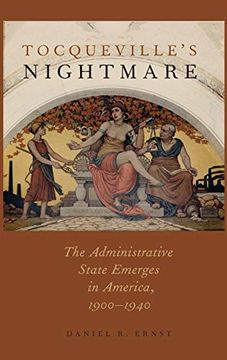Tocqueville's Nightmare: The Administrative State Emerges in America, 1900-1940 (in English)
Synopsis "Tocqueville's Nightmare: The Administrative State Emerges in America, 1900-1940 (in English)"
In the 1830s, the French aristocrat Alexis de Tocqueville warned that "insufferable despotism" would prevail if America ever acquired a national administrative state. Today's Tea Partiers evidently believe that, after a great wrong turn in the early twentieth century, Tocqueville's nightmare has come true. In those years, it seems, a group of radicals, seduced by alien ideologies, created vast bureaucracies that continue to trample on individual freedom.In Tocqueville's Nightmare, Daniel R. Ernst destroys this ahistorical and simplistic narrative. He shows that, in fact, the nation's best corporate lawyers were among the creators of "commission government" that supporters were more interested in purging government of corruption than creating a socialist utopia, and that the principles of individual rights, limited government, and due process were built into the administrative state. Far from following "un-American" models, American state-builders rejected the leading European scheme for constraining government, the Rechtsstaat (a state of rules). Instead, they looked to an Anglo-American tradition that equated the rule of law with the rule of courts and counted on judges to review the bases for administrators' decisions. Soon, however, even judges realized that strict judicial review shifted to courts decisions best left to experts. The most masterful judges, including Charles Evans Hughes, Chief Justice of the United States from 1930 to 1941, ultimately decided that a "day in court" was unnecessary if individuals had already had a "day in commission" where the fundamentals of due process and fair play prevailed. This procedural notion of the rule of law not only solved the judges' puzzle of reconciling bureaucracy and freedom. It also assured lawyers that their expertise in the ways of the courts would remain valuable, and professional politicians that presidents would not use administratively distributed largess as an independent source of political power. Tocqueville's nightmare has not come to pass. Instead, the American administrative state is a restrained and elegant solution to a thorny problem, and it remains in place to this day.

